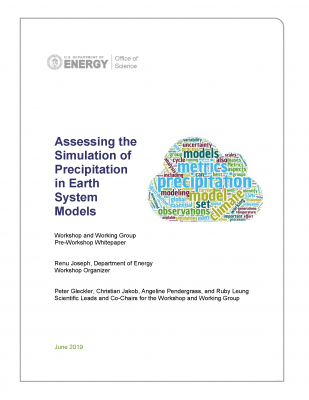DOE Hosts Precipitation Metrics Workshop
The Regional and Global Model Analysis (RGMA) Program Area within the Earth and Environmental Systems Modeling Program in the Climate and Environmental Sciences Division at the U.S. Department of Energy hosted a workshop focused on "Assessing the Simulation of Precipitation in Earth System Models.”
From July 1 to 2, 2019, about two dozen atmospheric scientists and officials from DOE, National Oceanic and Atmospheric Administration (NOAA), and the U.S. Global Change Research Program met in Rockville, Maryland for the DOE-sponsored Precipitation Metrics Workshop.
The workshop was co-chaired by Peter Gleckler of Lawrence Livermore National Laboratory (LLNL), Christian Jakob of Monash University in Australia, Angeline Pendergrass of the National Center for Atmospheric Research (NCAR), and Ruby Leung of the Pacific Northwest National Laboratory (PNNL). According to workshop Pendergrass, the two-day event was an opportunity for researchers to share their expertise and perspectives on metrics for evaluating precipitation in climate models against observational data sets. A pre-workshop whitepaper, “Assessing the Simulation of Precipitation in Earth System Models” was prepared by the organizers, science leads and co-chairs.
The workshop kicked off with a welcome and overview from DOE Climate and Environmental Sciences Division (CESD) Director Gary Geernaert and DOE Regional and Global Model Analysis (RGMA) Program Manager Renu Joseph. Over the next two days, presentations included:
- Aims and goals for benchmarking precipitation in climate models
- A proposed initial set of metrics
- A modeling perspective
- An impacts perspective
- Evaluating simulated precipitation with satellite observations
- Extremes evaluation under observational uncertainty
- Connecting spatial and temporal scales of precipitation
- Return value extremes and scale mismatch in model evaluation
- Use-inspired metrics
- Evaluating simulated precipitation with ARM data
- Convection onset metrics
- Machine learning and frontal systems
- Extratropical and frontal rainfall
- A regime-oriented perspective on evaluation of precipitation
- Variability of monsoons
For more information on this workshop, contact Angie Pendergrass.


